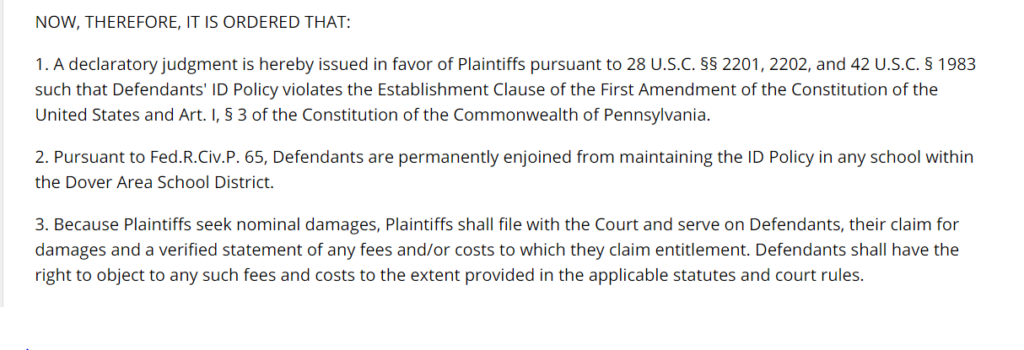ID: One of four big legal actions that roiled York County
In 2004-2005, the world’s eyes were fixed on Dover. There, a statement about Intelligent Design was read in science class
46 West Canal St., Dover
The situation
The 250th anniversary of York County in 1999 was a grand celebration, with a parade, commemorative books and music written for the occasion.
But soon after the clock ticked to 2000, the excitement of the 250th and the promise of the new millennium were tamped down by a succession of high-profile and consuming community controversies.
Indeed, the early 2000s represented a tumultuous era in York County’s 900 square miles in the form of at least four legal proceedings.
First came emotional, long-delayed trials for the assailants in two race riots murders from the late 1960s. Then came another high-profile trial in a wrenching fratricide case, the Witman court proceedings.
The Dover intelligent design trial came next, exceeding the first two in international attention.
Then shortly after Dover, an eminent domain dispute over scenic farmland in Lower Windsor Township roiled the county and resulted in voters ousting two sitting county commissioners.
For some, parts of these proceedings did bring a degree of much-sought-after resolution, some form of redemption. But for others, these controversies created great division. All would agree that they agitated – even exhausted – the York County community. And we haven’t even mentioned three violent attacks in York County schools.
We’ll explore the race riot trials, the Witman case and the Lauxmount eminent domain dispute in future Witnessing York posts.
As for the ID case, the 15th anniversary of the federal judge’s decision in the Dover intelligent design trial provides an opportunity to revisit a case sometimes compared to Tennessee’s Scopes Monkey Trial in the 1920s.
In 2004, parents took the Dover Area School District to federal court for presenting an alternative theory to evolution in science classrooms. As with Lauxmont, elected officials – the pro-ID school board – was ousted even before the federal judge decided against the district on Dec. 20, 2005. In both of these cases, county residents showed with their votes that they might seek remedy in actions that they consider extreme, contrary to stereotype.

The witnesses
The intelligent design discussion, a movement that caught the attention of President George W. Bush, reached its high-water mark in the Dover case.
Those arguing for intelligent design say that the complexity of the universe and living things can be best described by an intelligent cause rather by some random process. Critics, as expressed in the Dover case, say ID is a front for “creationism.”
In the end, Judge John E. Jones III ruled in favor of the parents or plaintiffs, writing that intelligent design “cannot uncouple itself from its creationist, and thus religious, antecedents.”
What did happen at this moment in which Dover and York County were thrust into the international news – and with enough force that it’s remembered on a United Kingdom podcast 15 years later?
We’ll answer that with a series of 11 quotes from news coverage of Kitzmiller v. Dover Area School District.
1. “Students will be made aware of gaps/problems in Darwin’s Theory and of other theories of evolution including, but not limited to, intelligent design. Note: Origins of life will not be taught.”
– By a 6-3 vote, the school board decided to mention intelligent design in ninth-grade biology classes. Oct. 18, 2004.
2. “Because Darwin’s Theory is a theory, it is still being tested as new evidence is discovered. The theory is not a fact. Gaps in the theory exist for which there is no evidence. … Intelligent Design is an explanation of the origin of life that differs from Darwin’s view. The reference book, ‘Of Pandas and People,’ is available for students to see if they would like to explore this view in an effort to gain an understanding of what Intelligent Design actually involves. As is true with any theory, students are encouraged to keep an open mind.”
– Excerpt from statement that was read to students. Nov 18, 2004.
3. “Teaching students about religion’s role in world history and culture is proper, but disguising a particular religious belief as science is not. … Intelligent design is a Trojan Horse for bringing religious creationism back into public school science classes.”
– Witold “Vic” Walczak, American Civil Liberties Union of Pennsylvania. Dec. 12, 2004.
4. “They are virtually synonymous.”
Barbara Forrest, philosophy professor testifying for the plaintiffs, citing how references to “creationism” in “Of Pandas and People” were replaced with “intelligent design.” Oct.5-6, 2005.
5. “I thought my testimony was good. … I thought I made all the points I had to make and that attorneys for the other side weren’t actually interested — they’re not interested in the science behind the issues.”
– Michael Behe, testifying for the defense, said natural selection alone cannot account for the complexity of life. Oct. 17, 2005. He made this statement outside of court.
6. “Are you sure you want to violate/one set of Constitutional rights/to argue another?/Are you sure your case is so weak/that you really need me?”
– Part of a poem by Joe Maldonado, freelance writer for the York Daily Record, who risked jail time and fines by staring down subpoenas from the plaintiffs seeking full testimony about his coverage of the then-pro-ID Dover school board. He later took the stand when the judge agreed, after strenuous objections against full testimony by attorneys for the YDR and York Dispatch, to restrict his testimony to what was published. Fellow Dispatch freelance writer Heidi Bernhard-Bubb faced similar subpoenas from the plaintiffs’ attorneys and ACLU. Sept. 27, 2005.
7. “Your Honor, I have one question, and that’s this: By my reckoning, this is the 40th day since the trial began and tonight will be the 40th night, and I would like to know if you did that on purpose.”
Jones replied: “Mr. Gillen, that is an interesting coincidence, but it was not by design. With that, I declare the trial portion of this extended case adjourned.”
-Judge John E. Jones III responds to a question posed by Patrick Gillen, an attorney for the defendant school district. The judge’s response was met with laughter and applause. Nov. 4, 2005.
8. “The voters were really fed up with Dover being a laughingstock and these people behaving so badly. And blankly being caught on camera lying, and then denying that they said it — the tape’s right there. To me, that was much more so [what] the voters voted out of office, than it was anything about intelligent design in and of itself.”
– Bryan Rehm, a plaintiff, after Dover CARES, the candidates opposing the sitting Dover school board, swept the school board election. Nov. 8, 2005.
9. “A declaratory judgment is hereby issued in favor of Plaintiffs … such that Defendants’ ID Policy violates the Establishment Clause of the First Amendment of the Constitution of the United States and … the Constitution of the Commonwealth of Pennsylvania.
“… Defendants are permanently enjoined from maintaining the ID Policy in any school within the Dover Area School District.”
– U.S. District Judge John E. Jones III rules against the Dover Area School District. Dec. 20, 2005.
10. “We wanted students to be able to debate and talk one theory against another. … Nobody was trying to force all students to become Christians or Muslims or Hindus.”
– Defendant Jim Cashman’s response to the ruling. (Cashman’s appointment to the school board came after the vote for the intelligent design policy.) Dec. 20, 2005.
11. “It was epic. It was epic and historic. And it was just — it was a once in a lifetime opportunity and adventure that could not have gone more smoothly for us, for our side anyway.”
– Walczak, for the plaintiffs, responding to the ruling. Dec. 20, 2005.
+++
Five years later, Jones said that though the case set precedent only in the U.S. Middle District, it had “persuasive value.” Other judges would cite the Dover ID case.
“And I think that, because of the notoriety this case received, and because of the million-plus dollars that the school district had to pay, and the clear violation of the Constitution, I think every single school board solicitor across the United States — if any school board in the years after Kitzmiller had any inclination to do something like this — said, ‘You’re going to run into a major problem here.'”

The questions
While evolution explains life through scientific theory, it was ruled that ID is simply an ideology that has not been tested through observable data. The Dover ID case makes it seem like these are the “two sides” to science. However, the two concepts use different methods with completely different standards. In sum, to debate ID v. evolution is like comparing apples to oranges. In what setting would it be appropriate to debate ID? How can we separate science from religion while still valuing both?
Related links and sources: York Daily Record files; Jim McClure’s York Town Square blog and this story: Dover ID case; NBC News. Top photo from Jim McClure.
— By JAMIE NOERPEL and JIM McCLURE



